Pros:
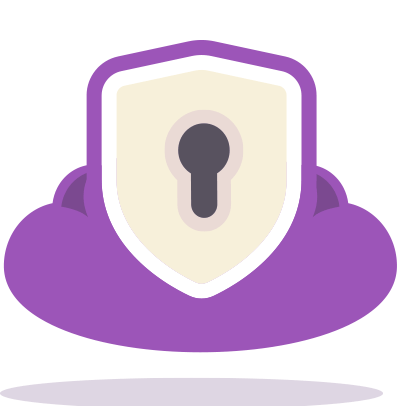
- Multiple Protocols: You get a wide range of options when it comes to protocols. The user can choose from OpenVPN with both the ports, L2TP, IPSec, PPTP, and IKEv2.
- No-logging Policy: The Swedish laws allow them to maintain absolutely no log of user’s data and they follow a 100% no-logging policy.
- Military Grade Encryption: They have kept the tunnel secure by employing the highest level of encryption possible, and the user can browse through the tunnel without any worries of data theft or leak
- IPv6 Leak Protection: The client supports IPv6, and you don’t need to manually turn off IPv6 on your devices to keep your IP from leaking.
- DNS Leak Protection: Most the VPN services miss this simple feature which can expose the location of the user.
- Port Forwarding: With port forwarding, you can expect better torrenting speeds and connect to your devices remotely.
- Internet Kill Switch: This feature will stop the internet traffic if the VPN connection drops, thus saving your valuable data from leaking on the internet.
- No caps on Bandwidth and Speed: The user gets unlimited bandwidth and speed on the client as there is no capping of speed or the bandwidth whatsoever.
Cons:
- Swedish Jurisdiction: Sweden is among the 14-Eyes countries, and this is enough to make a lot of people uncomfortable in using this product. These 14-Eyes countries internally share surveillance and other data of the citizens for various reasons.
- Limited Servers: They have got very few servers compared to most of the mainstream VPN services available. This can lead to increased server traffic as well as poor VPN service from the provider.
- Manual Selection: Even though there are very few servers on the network, it is not easy to scroll through all of them to find the best server available for oneself.
Website: Visit Official Site
Overview
At first site, PrivateVPN appears to have the all the qualities and features expected of a VPN service.
It is a product from Privat Kommunikation AB, which is a company based in Sweden.
| Quick Overview | |
|---|---|
| Protocols | OpenVPN, L2TP, IPsec, PPTP, IKEv2 |
| Platforms | Windows, Mac, iOS, Android, Linux, Routers |
| Jurisdiction | Sweden |
| Logging | No Logging |
| Encryption | AES-256 |
| Connections | Up To 6 Devices |
| Locations | 80+ Locations |
| Servers | 100+ |
| Netflix/P2P | P2P Available |
| Payment Options | Credit Card, Bitcoin, PayPal |
| Support Options | Live Chat |
| Pricing From | $ 3.82/mo Billed For 12 Month With 1 Month Free |
| Guarantee | 30 Day Money Back |
| Free Trial | No |
| Website | Visit Website |
Sweden, as we all know is one of the 14-Eyes countries. Even though the privacy laws are strict there, the fact that the country shares a lot of public data with the other 14-Eyes countries cannot be neglected.
It provides military grade encryptions, multiple protocols, diverse server locations, no logs policy and a lot of other security measures.
You get all the features expected of a VPN service be it concerning security or privacy or versatility.
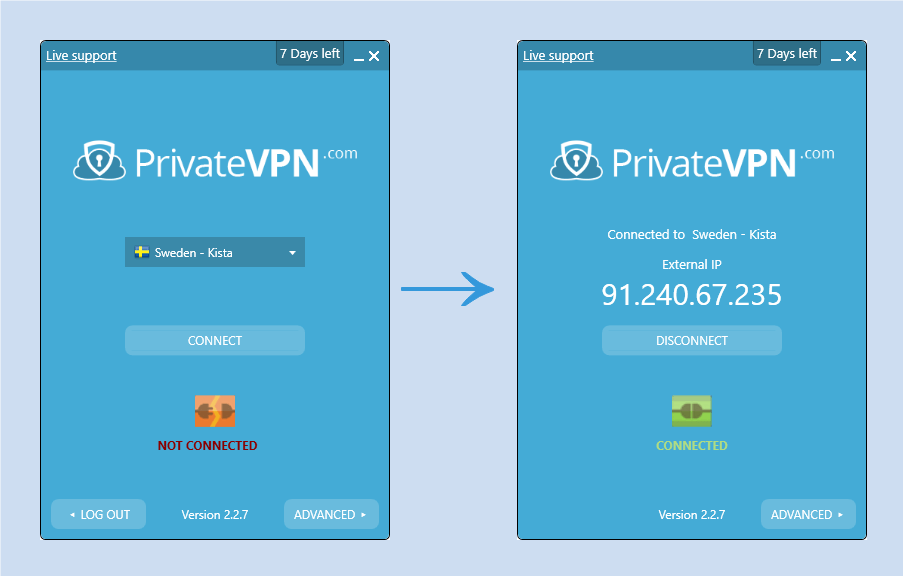
In this review, we will examine how does this VPN service perform with all these features, and how much the Swedish jurisdiction will affect the privacy policy of the product.
Servers

When it comes to a VPN network, the number, as well as the location of servers, play a vital role in the quality of service that a user gets.
If a server is in the vicinity of the user, he/she can expect better internet speed. A close by server also translates to improved latency and the user experience gets refined.
Traffic through each server will be low if there are a lot of servers in a location which is again beneficial for the user.
PrivateVPN consists of more than 80 servers in around more than 50 locations.
If we look at the numbers only, this is not impressive at all. But if you look at the server locations, they cover a whole lot of ground there.
But if they do have 44 thousand customers, as mentioned on the official website, we think that high traffic servers will be a common occurrence on the network and it will be interesting to see how it affects the speed and performance of the service.
There are a few streaming dedicated servers in various countries, and you need to search them in the server list as they are not listed anywhere separately.
All the servers allow P2P file sharing, but it might be possible that the download speeds vary a lot from one server to another in the same region.
There is no automatic server selection, and server sorting was dearly missed while using the client.
Privacy Policy
Many of the VPN services claim of having a no-logs policy, but it turns out that they do maintain logs of some sort.
It is natural for a service to maintain the transaction records as most of the times the payments are made through a third party such as PayPal. The emails are also used to communicate with the user and logging of emails is also understandable.
But logging of any other user data such as IP address and other personal information is not a good sign.
PrivateVPN also claims of having a no logs policy. We carefully went through their privacy policy and here are the facts from it.
They do not log any of the user’s activity inside the VPN tunnel. However, they could have added a few more sentences in the policy to explain if this includes session duration, timestamps, and the other grey areas.
There will be cookies when you visit their website, and the cookie information can be shared with a third party, but this is mostly non-personal information and is used for analytics purposes.
They do store the transaction details, and you cannot bypass this as cryptocurrencies are not included in the mode of payment.
The 30-day money back offer is valid for the new users only when the data usage is less than 100GB for the month.
The 14-day day return policy is applicable only if the user has not connected to any of the servers they provide on the network. If you ever connect to one of their servers, then you are not eligible for the 14-day refund policy.
Connection Time Analysis
| Trial No. | Time to establish a connection (seconds) |
|---|---|
| 1 | 7.94 |
| 2 | 11.13 |
| 3 | 10.7 |
| 4 | 12.48 |
| 5 | 10.67 |
| 6 | 11.12 |
| 7 | 16.62 |
| 8 | 10.73 |
| 9 | 11.91 |
| 10 | 9.13 |
| Average Time In Seconds | 11.243 |
Connection time reflects how fast the client is able to connect to the user. It gives an idea about how fast the service is going to be.
We did the connection time analysis for the service with 128-bit encryption to get a faster response time.
An average of 11.24 seconds is not very promising though. We have come across VPN services which take less than 5 seconds to connect to the network.
There can be a lot of reasons for this slower performance. Our intuition tells us that server traffic might be the culprit here.
They have very few servers, and that always keeps the possibility of high-density server traffic in the picture.
Even if the reason is not high server traffic, the VPN provider needs to find the cause of this and improve the connection time of the client.
Speed Test
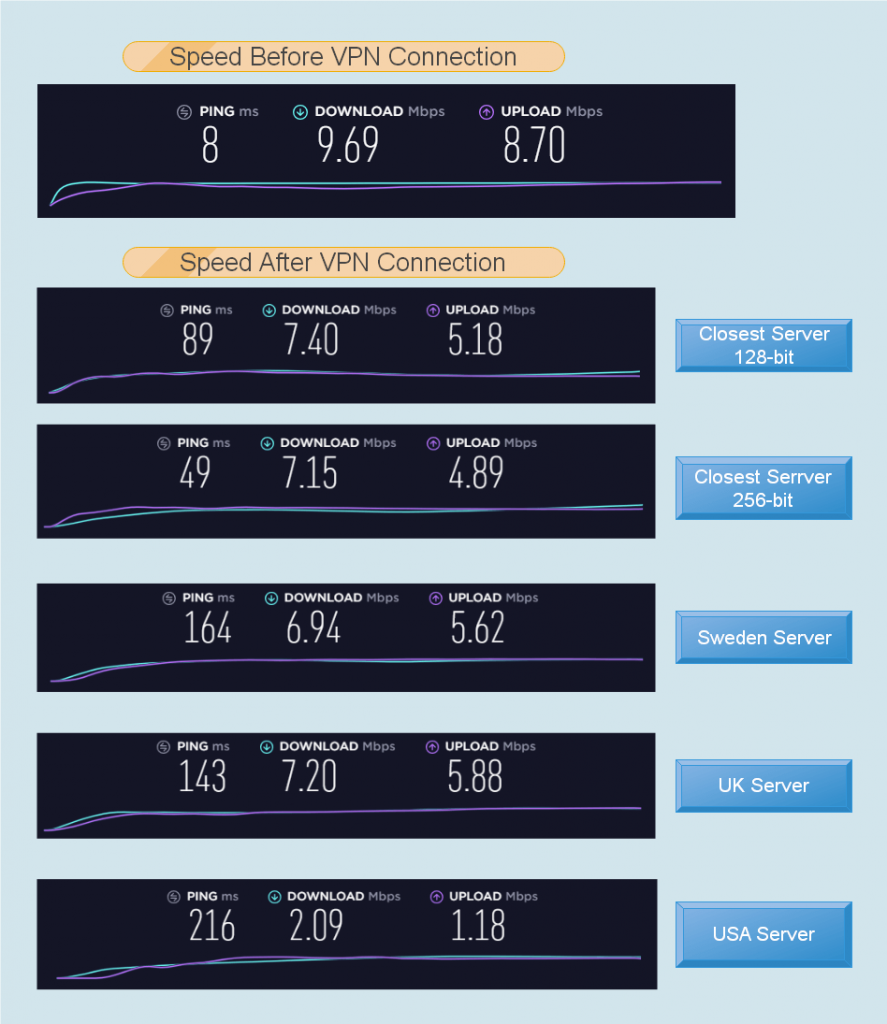
If a VPN service is buffed up with all the features there can be, has all the servers it can have, has the best policies and jurisdiction available, but if it is not able to yield fast speeds, then all the qualities mentioned above go down the drain.
Users want to surf the web securely but not by sacrificing all the internet speed they got. Small reductions in the speeds can be neglected, but most of the users have certain expectations from the VPN service when it comes to speed.
PrivateVPN does not provide the automatic server selection option, so we connected to the closest available server at both 128-bit and 256-bit encryptions to see if there was any noticeable difference.
We also connected to some of the popular server locations just to get an idea of the average speed available on the network.
PrivateVPN is neither the fastest nor the slowest one out there. We documented a 24% decrease in the original speed when connected to the closest server at 128-bit encryption.
The difference in the speeds on the same server when connected through 128-bit and 256-bit encryptions was only 4% which is a very good sign.
It means that the user will not lose much speed when he/she prefers the more secure way to browse the internet.
The Swedish and the UK servers performed equally well, but we experienced quite a decrease in the original speed when connected to the USA server.
The overall speeds recorded were satisfactory, and the loss in the original speed is not alarming. However, it does not mean that there is no room for improvement.
If PrivateVPN can give around 80% of the original speed regularly, then it will be a fierce competitor for all the VPN services out there.
Security
They kept all the bases covered when it came to keeping the VPN tunnel safe and secure.
For encryption, they provide you with the highest-grade encryption available, which is overkill in many ways. If you do appreciate the fact that even the 128-bit encryptions are safe enough, then they got you covered too.
There is an option to choose between 128-bit and 256-bit encryption, and we do appreciate the addition of this feature. The reason is simple for us liking this option though; we love more options at our disposal.
They have got protocols for you in a platter.
Along with OpenVPN in the TCP and UDP mode, you also get the option to choose from the other available protocols-L2TP, IPSec, PPTP, and IKEv2.
However, OpenVPN is the recommended option, by PrivateVPN as well as by us. There can be situations and users who may need the other protocols as well.
When we combine the options of protocols along with the options available for encryption, we get a plethora of combinations to choose from, and we think that there are hardly any VPN services which can beat this.
It is not just the protocols and the encryption that makes us call this a safe and secure VPN service. There are these additional features which keep the user’s data and privacy protected.
DNS leak protection and IPv6 leak protection keep the user’s location from leaking on the internet. These are not the same things though.
DNS leak will compromise the geo-location or the area of the user whereas an IP address leak will make the user traceable to his/her pin-point location.
PrivateVPN comes with DNS leak protection as well as IPv6 leak protection, and these switches are already turned on by default.
Internet kill-switch is one more security measure which can come in handy at times. This switch stops the internet traffic when the VPN connection drops, thus preventing the user from browsing the web without the safety of the VPN tunnel.
User Interface and Experience
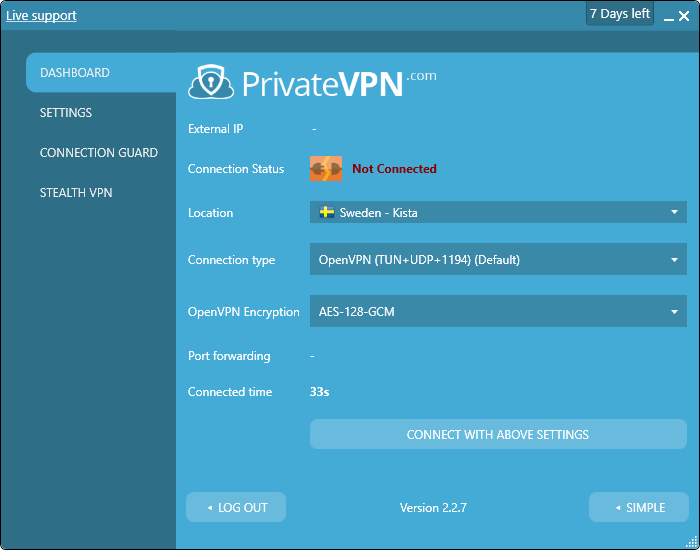
The user interface acts as the face of the product and most of the times people do judge a book by its cover. The user interface can play a pivotal role in the success of a VPN product.
Some people prefer an advanced user interface with as many options as possible on the other hand there are some who like to keep things simple. PrivateVPN’s user interface takes care of both the houses.
The user interface can be used either in the ‘simple’ mode or in the ‘advanced’ mode.
In the simple mode, the user can select the server and connect with the network right away under the default settings.
If you want to play around a bit more and see all the features that the client has to offer, then you need to choose advanced mode.
The advanced mode user interface is divided into four tabs: Dashboard, Settings, Connection Guard, and Stealth VPN.
In the dashboard, you get to choose the server location, protocol, and encryption.
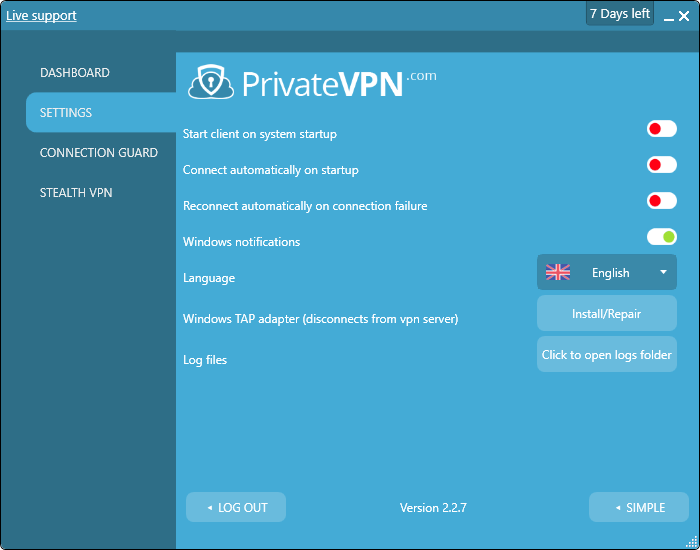
In the settings tab, there are few toggle switches which include ‘Start client on Startup’ and ‘Connect automatically on startup’. Most of the options are to customize the client according to the user’s preference.
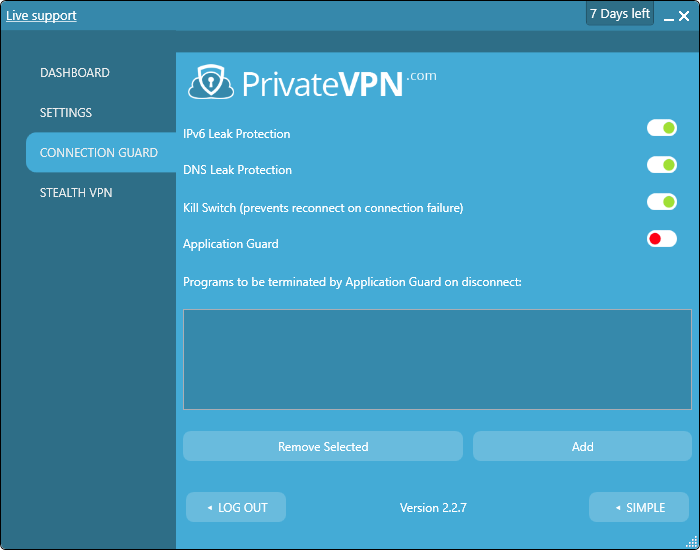
The third tab is ‘Connection Guard’ which allows you to enable the added security measures if you want. It includes DNS leak protection, IPv6 leak protection, Kill-switch, and a few other options.
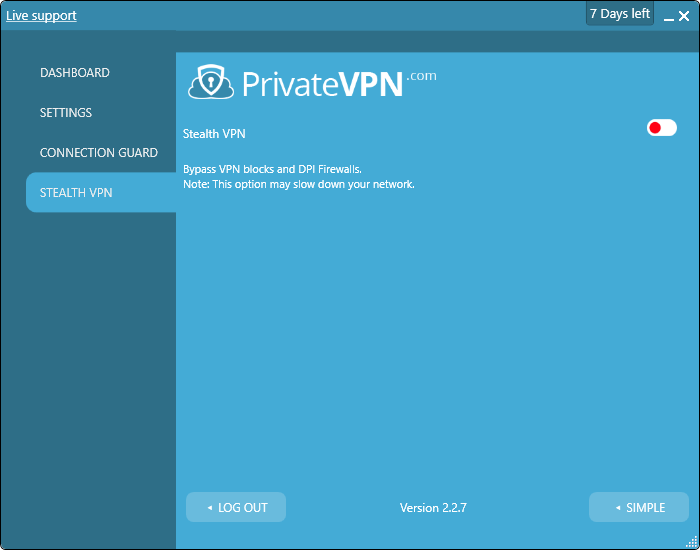
In the end is the ‘Stealth VPN’ tab. It can be enabled to bypass DPI and VPN firewalls, but it can slow the network speed by a considerable margin.
Platforms and Devices
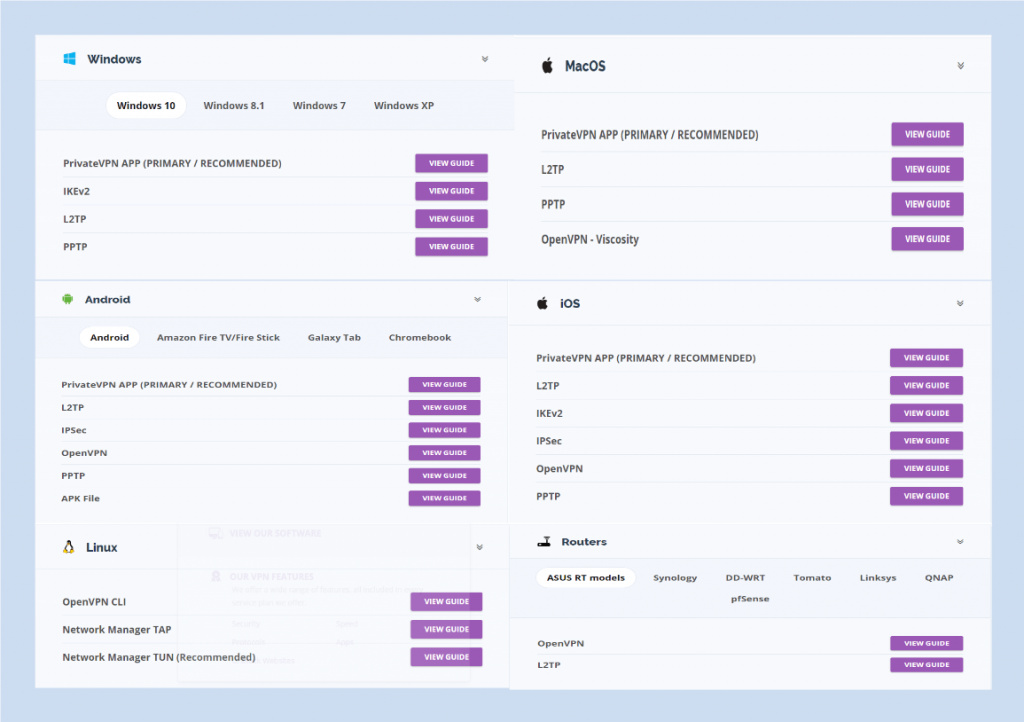
PrivateVPN allows the service on six different devices simultaneously. Most of the VPN services provide five simultaneous connections, and they cheekily became better than all of them by adding one more device in their service.
The service is available across all the major platforms which include
- Windows
- MacOS
- Android
- iOS
- Linux
- Routers
You can find guides on the official websites to have the service on these platforms.
However, we were unable to find any extensions for any of the browsers.
Xbox and PlayStation were also missing from the platform support list.
They need to come with ways to improve user accessibility. Ideally, the VPN service should be available for all the user’s devices which connect to the internet.
It is one area where there is a lot of room for improvement and PrivateVPN needs to work on this issue if they want to stay relevant in the VPN world.
Customer Support
Customer support is one of the most under-appreciated parts of the service.
If someone gets great customer service, there is no mention of it. But if the customer service is inefficient in any way, then there is always some grilling which follows it.
PrivateVPN boasted of a 24/7 customer service on their website. They even mentioned that they have got the developers in the customer executive team and that they don’t outsource their customer support jobs.
They sort of went out of their way to emphasize the fact that they are very serious about their customer support.
This got us excited, and we were expecting one of the best customer service experiences until now.
But all our excitement melted away when we found out that they not only allocate the customer support services to third parties, they are also unable to provide a 24/7 customer support.
You can expect to get the reply of a query in maybe 24 hours.
The service itself was satisfactory when we look at the answers we got, but it is the false promises of a 24/7 customer support and developers in the chat support team, that broke our spirits.
The FAQ section can be more thorough and cover more relevant topics.
Conclusion
PrivateVPN has all the features available which we expect from a capable VPN service, yet it is still not in the top tier of the VPN products.
A VPN service with these many features should be able to cater much better performance compared to what it is delivering at the moment.
The security measures are good enough, but the number of servers and the speed can be improved upon.
The fact that the product is from Sweden makes things even more complicated.
The false promise about customer support also reduces reliability. It is one thing not to have certain features and an entirely different thing to make false claims.
User’s trust is almost impossible to regain once lost.
We still expect some positive upgrades in the product in the near future, and hopefully, it will be able to jump across to the top tier section of VPN services.
